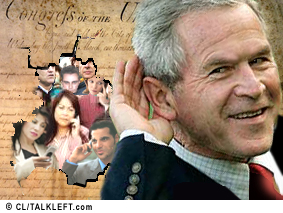In a case poignantly styled ACLU v. NSA, a group of attorneys, journalists and scholars are asking U.S. District Judge Anna Diggs Taylor of the Eastern District of Michigan to issue an order that would enjoin the executive branch from carrying out its surveillance program, the one in which the feds monitor the telephone conversations of certain Americans without a court order or any other independent safeguard against abuse. Such a ruling would immediately be appealed and might take the fast-track to the United States Supreme Court. And it would significantly impact the other controversial government effort to collect and analyze massive amounts of telephone records to discern potential communication patterns between terror suspects.
More hearings will be held July 10. The ACLU says (received by e-mail, will be online soon):
The American Civil Liberties Union and the ACLU of Michigan appeared in federal court today to argue that the Bush administration's warrantless spying program is unconstitutional and should be stopped. This was the first time a court heard arguments on the legality of the National Security Agency program.
"Under our Constitution, no one is above the law, not even the president," said Ann Beeson, Associate Legal Director of the national ACLU, who argued today's case. "The government's arguments that the president, alone, can decide to spy on Americans without a warrant are fundamentally un-American and contradict the vision of the founders of our democracy."
As for the arguments:
Representing a host of prominent journalists, scholars, attorneys and national nonprofit organizations who say that the NSA program is disrupting their ability to communicate effectively with sources and clients, the ACLU charged that the program violates Americans' rights to free speech and privacy under the First and Fourth Amendments of the Constitution. By circumventing the Foreign Intelligence Surveillance Act, the ACLU argued that the program violates separation of powers principles and encroaches on Congress' power to regulate the president's authority to spy on Americans. FISA, which was passed by Congress in 1978, requires the executive branch to obtain a warrant before engaging in electronic surveillance of Americans.
...."The government is trying to shut this case down, without any legal review, because it simply knows that this program is illegal," said Kary L. Moss, Executive Director of the ACLU of Michigan. "To avoid any oversight, the government is trying to hide behind the once-rare state secrets privilege. Fortunately, everything we need to argue this case is already available in the public domain."
More on the ACLU case is available here.




